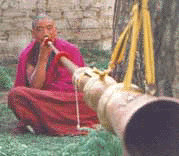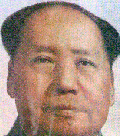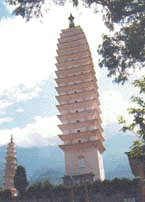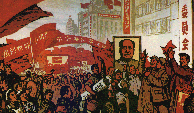Much of human history from now on will be about China. Its past precedes us by thousands of years, and it's near-future is just beginning to become clear. Each day brings thousands, and soon millions of new Chinese citizens to the global internet, to MTV, to the West on business, etc. By 2020, the WTO predicts China will become the world's No.1 tourist destination. Multinationals are preparing now for the emergence of the largest consumer market on Earth. With one human being for every four people on the planet, and millions of overseas Chinese living in every other country, China may eventually become the dominant culture of the planet.
The key to Chinese life is not so much what is happening in the geriatric
Beijing political bureaucracy, but is more, as always, in the undercurrents
of Chinese cognoscenti...the artists, the students, the intellectuals &
now the digerati. The courts of power in China have always followed their
lead and will again.
Worth asking is what this emergent global Chinese culture will be about.
Looking backwards for clues, one may find insight from the powerful trajectory
of Buddhism in China, and how, despite the recent barren years of Marxism,
Buddhism, which was introduced by Indian monks less than a century after
Buddha, has enjoyed a long, deep (and still-growing) relationship to China's
soul.  Spiritually starved, I have recently seen Chinese students flocking
to the newly remodeled Buddhist temples in the big cities of the south.
Buddhism has again become a kind of state faith in spite of the recent philosophical
contempt for all religion.
Spiritually starved, I have recently seen Chinese students flocking
to the newly remodeled Buddhist temples in the big cities of the south.
Buddhism has again become a kind of state faith in spite of the recent philosophical
contempt for all religion.
 I suspect that the young people of China are counting on the brave youth
and intellectuals of the world to demand total freedom for their people and for the Tibetan
people, and to bust the Beijing government for strangling Tibet, imposing
cultural and political censorship, and keeping a busy agenda of state-killing
etc. The film Kundun
beautifully illustrates this important story.
I suspect that the young people of China are counting on the brave youth
and intellectuals of the world to demand total freedom for their people and for the Tibetan
people, and to bust the Beijing government for strangling Tibet, imposing
cultural and political censorship, and keeping a busy agenda of state-killing
etc. The film Kundun
beautifully illustrates this important story.
However, in its own comparatively puny past, the U.S. has been on the
wrong side of most Chinese struggles to evolve politically and socially.
Under pressure from the banks, Roosevelt ignored Mao's early pleas for Yankee
help to establish a Chinese democracy modeled after America's, and more
recently George Bush  embarrassed all Americans by successfully threatening
economic sanctions to force China's markets open to Marlboro and the like.
Home to 300 million of the world's estimated 1.1 billion smokers, it is
no secret to the tobacco industry that capturing the Chinese cigarette market
share would render the diminishing U.S. market of practically no consequence.
embarrassed all Americans by successfully threatening
economic sanctions to force China's markets open to Marlboro and the like.
Home to 300 million of the world's estimated 1.1 billion smokers, it is
no secret to the tobacco industry that capturing the Chinese cigarette market
share would render the diminishing U.S. market of practically no consequence.
Many progressives seem to abhor the path China is on. That the face of Ronald McDonald is already familiar to as many Chinese as American children is a painful fact. But thanks to Mao who in spite of his crimes was the first to bring even the concept of education for the masses to bear, China is no longer a backward nation in terms of global media. The numbers of children learning English in China now exceeds that of the U.S. Pirated videodisks of the movie "Titanic" were available throughout China last November, a month before its release in U.S. theaters, and about half a million pirated disks of major films are smuggled into China every day from Macao. To expect that the Chinese people should not want Hollywood films, Levi's, DVD players, washing machines and fast cars, etc is almost culturally fascistic, and not terribly honest in terms of our own continuing patterns of consumption. It is reasonable to expect that every Chinese family wants and will have a car.
The West needs to think about what this inevitability will mean for the
breathability of the air at home, and global climate change. The inescapable
fact is that China is developing at an unprecedented pace. In every city,
and even in many of the villages, scores of skyscrapers are being erected
on a 24hr basis throughout China. Freeways are invading every province,
and in the cities, the global business media and all the familiar Western
brands are already ubiquitous.
Construction of the infrastructure is replicating the damaging development patterns of the West with nuclear power, toxic chemical dependency, poor public transport, rampant pollution, as well as wasteful energy and natural resource consumption. Unconcerned with public opinion, and facing a giant demand for power, China's government is planning to build dozens of new nuclear power plants and increase nuclear capacity 25 fold by 2020.
China is losing almost a million acres of crop land annually, mostly
to various forms of development, while  also converting large tracts
of remaining land to grain for livestock. And while it is one of the world's
water rich countries, China's rivers, groundwater and watersheds are all
undergoing a process of degradation and pollution. More than 60 percent
of the rainfall in Guandong province is acid rain and Chinese rivers contain
up to 4 times the world level of fecal contamination. Nuclear waste dumping
has begun inside Tibet and is occurring near the sources of many major rivers
that flow through ten countries in Asia. Hundreds of Chinese cities are
already short of water, and the water table under Beijing has dropped 37
meters over the past 40 years.
also converting large tracts
of remaining land to grain for livestock. And while it is one of the world's
water rich countries, China's rivers, groundwater and watersheds are all
undergoing a process of degradation and pollution. More than 60 percent
of the rainfall in Guandong province is acid rain and Chinese rivers contain
up to 4 times the world level of fecal contamination. Nuclear waste dumping
has begun inside Tibet and is occurring near the sources of many major rivers
that flow through ten countries in Asia. Hundreds of Chinese cities are
already short of water, and the water table under Beijing has dropped 37
meters over the past 40 years.
In spite of plans to spend $20 billion over 30-years for topsoil protection, and tax credits for green investments by foreigners, if China's development continues to at the current pace for too long, we will all be swimming in her effluent. Chinese coastal pollution is already blowing in California air at measurable levels. If Western based corporations really understood the extent of our future interdependence with China, they would be falling over themselves to airdrop free scrubbers, catalytic converters, non-ozone depleting coolants, and other eco-techno-alternatives.
Even more impressive than her spectacular industrial transformation in
record time is China's momentous self-discovery now in process: that her
inscrutable and heretofore unpenetratable culture is now global,  and
that for the first time in its history, there is no more "Chinese"
history. Hard as it may seem to see today, the evidence is there to support
the notion that China's continuously growing influence in the global economy
will pave the way for it to become the key player in designing the modern
global state.
and
that for the first time in its history, there is no more "Chinese"
history. Hard as it may seem to see today, the evidence is there to support
the notion that China's continuously growing influence in the global economy
will pave the way for it to become the key player in designing the modern
global state.
It is China, already the mother nation to all of Asia and the Pacific
(including  California), that we can expect to eventually become
no less than the spiritual, financial, ecological and cultural capital of
the Earth. Like a surfer caught in the eye of a giant tidal wave, we might
not easily perceive the breadth and vastness of even the current phase in
this centuries-running yet still unfolding Chinese cultural revolution.
And unlike the phases of cultural revolution in the recent past where we
were merely spectators, the wired generation around the globe are key players
in the Sino shapeshifting now underway.
California), that we can expect to eventually become
no less than the spiritual, financial, ecological and cultural capital of
the Earth. Like a surfer caught in the eye of a giant tidal wave, we might
not easily perceive the breadth and vastness of even the current phase in
this centuries-running yet still unfolding Chinese cultural revolution.
And unlike the phases of cultural revolution in the recent past where we
were merely spectators, the wired generation around the globe are key players
in the Sino shapeshifting now underway.
more info:
images courtesy of China Travel Agency, Rob Gray, & Adrian Ross